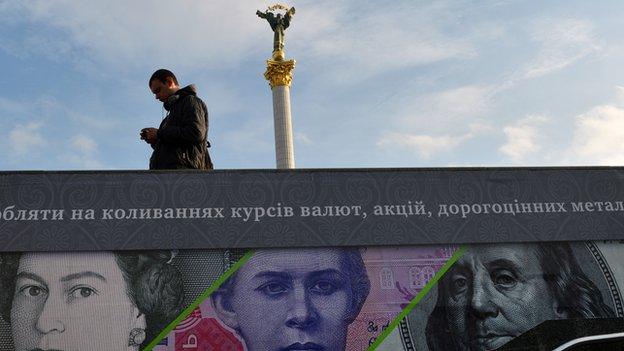Ukraine economy: How bad is the mess and can it be fixed?
- Published
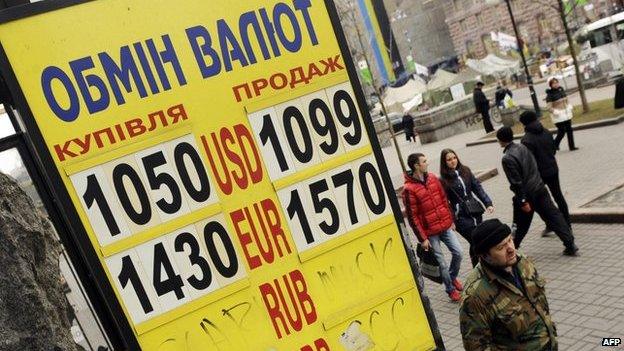
The Ukrainian currency has reached historic lows against this dollar this year
The International Monetary Fund (IMF) has approved a $17.1bn (£10.1bn) bailout for Ukraine to help the country's struggling economy.
The money will be released over two years, with the first instalment of $3.2bn available straight away.
The IMF loan will also unlock further funds worth $15bn from other donors, including the World Bank, EU, Canada and Japan.
Months of turmoil have taken their toll. Interim Prime Minister Arseniy Yatsenyuk warned that the economy would shrink by at least 3% this year - and by as much as 10% without international assistance.
But the price of that help will come in the form of higher energy bills and wage freezes.
So why is the Ukrainian economy in such bad shape? And what is being done to fix it?

What is the state of Ukraine's economy?
In a nutshell: heavily indebted.
Ukraine's new government has said it needs $35bn (£21bn) to pay its bills over the next two years, which the new loans should mostly cover. It owes the Russian gas company Gazprom $1.9bn.
The Ukrainian economy shrank 0.3% in 2013, the IMF estimates. And the months of street protests, when the barricades were up on the streets of the capital, Kiev, will also have had an effect.
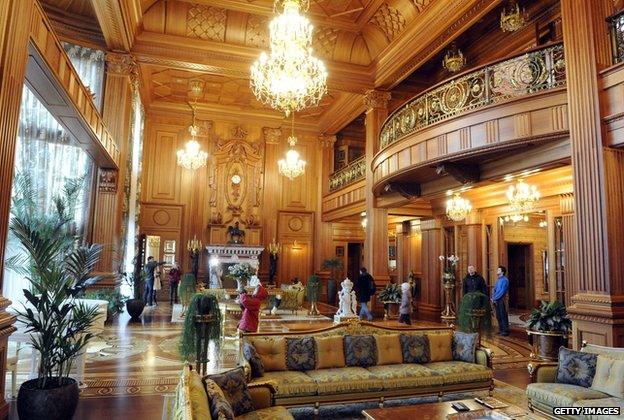
Ukrainians were stunned by the opulence in which Mr Yanukovych had been living
The new government has also accused ousted President Viktor Yanukovych and his government of stripping billions from state coffers.
The currency, the hryvnia, lost nearly a fifth of its value in February alone. It now stands at 11 to the US dollar, down from eight in January.
The economy is struggling to recover from a recession and has been shaken by capital flight, as worried investors move their money abroad.
Efforts to prop up the hryvnia have also depleted foreign currency reserves.
Ukraine's stormy economy has history

What difference will international aid make?
A few months ago, a $15bn rescue package from Russia looked likely. But that was before street protests led to the removal of President Viktor Yanukovych, Moscow's man.
Now the IMF and other international donors are stumping up a total of $32.1bn, reducing the risk that Ukraine will default on its debts.
But the loan is dependent on strict economic reforms, including raising taxes and energy prices.
The government has already raised gas prices by 50% in an effort to secure the bailout. It has also agreed to freeze the minimum wage.
And Ukraine has a chequered history with the IMF: it failed to keep to the terms of previous assistance packages in 2008 and 2010.
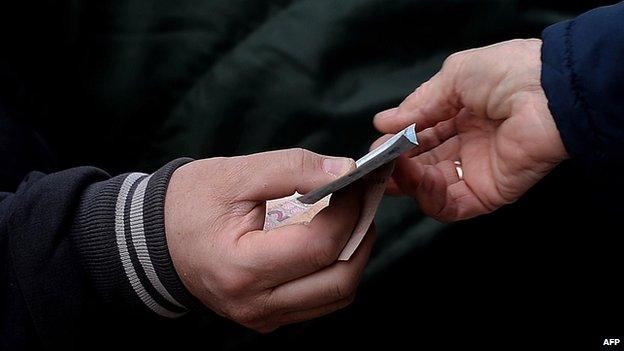

What kind of economy does Ukraine have?
Ukraine has a history of corruption and mismanagement that goes back to Soviet times.
Consider this: Ukraine's economy is smaller than it was in 1992, shortly after the collapse of the Soviet Union. At the time, Ukraine and Poland had similar-sized economies, but Poland's economy is now twice as big as Ukraine's.
The IMF estimates that the Ukrainian economy shrank 0.3% last year after barely growing in 2012.
Ukraine has a lot of coal mining, especially around the eastern city of Donetsk, as well as ageing heavy industry including shipbuilding, steel and arms. However, because many industries are so energy-inefficient, they are highly dependent on imports of Russian gas, which have been heavily subsidised.
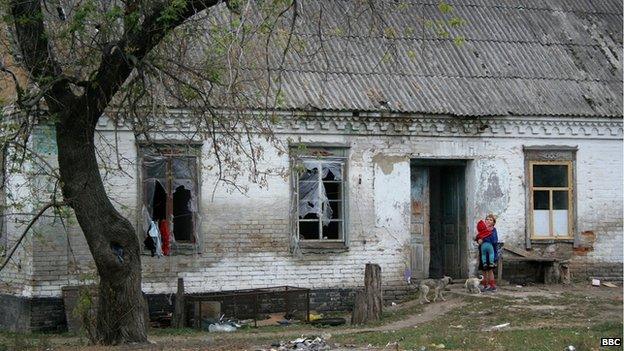
Much of Ukraine remains grindingly poor
Farming is also important: Ukraine has more arable land than any other European country and is a major producer of grain and sunflower oil. Wheat prices have risen 20% on world markets, partly because of the fear of instability in Ukraine.
And then there is the shadow economy: everything from cash-in-hand labour to corruption to illegal activities. A 2012 study by two Ukrainian academics, external reckons the shadow economy is equivalent to 44% of Ukraine's economic output.
In 2013, Ukraine was ranked 144 out of 177 in Transparency International's Corruption Perceptions Index.
Business and politics are deeply intertwined: Ukraine's richest man, Rinat Akhmetov was until recently an MP and a supporter of ex-President Yanukovych. His companies have received an important share of state tenders.

What is the new Ukrainian government doing?
Before the latest household gas price rise, consumers paid only a quarter of the cost of imported gas. The price increase was one of the conditions demanded by the IMF, but it was an unpopular measure that President Yanukovych refused to take.
As well as the minimum wage freeze, taxes will go up and 10% of civil servants will be made redundant. There are also plans to cut corruption and red tape.
And the IMF wants the hryvnia to float more freely against the dollar.
But the government faces a dilemma: if its reforms inflict too much pain, protesters could - having removed one government - take to the streets again. Just ask the Egyptians.
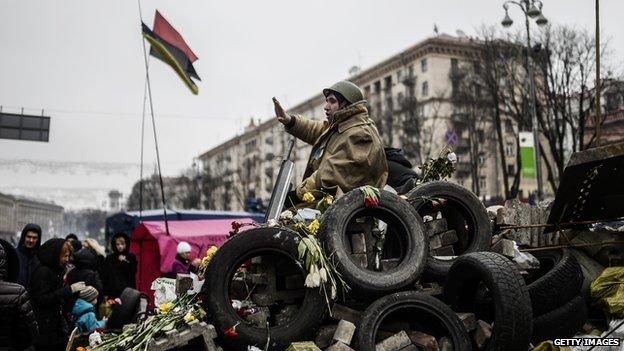
Protesters could return to the barricades if they are disappointed by the new government

What effect will the dispute with Russia have?
The dispute with Russia has already cost Ukraine the Crimea region. It also means higher energy prices.
In return for the lease of the naval base at Sevastopol for the Black Sea fleet, Russia agreed to subsidise energy exports to Ukraine.
Now Crimea has been annexed by Russia and the Russian state-controlled producer Gazprom is ending Ukraine's one-third discount.
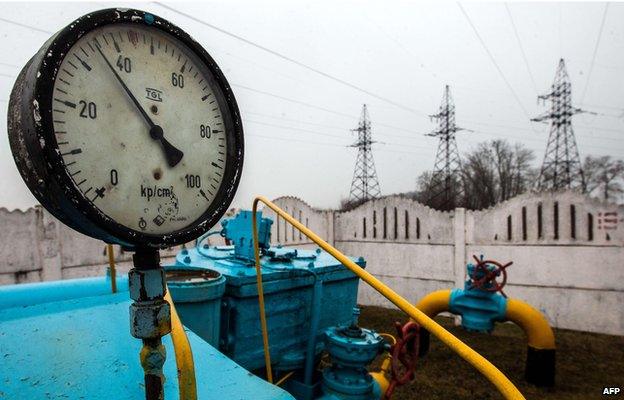
Under pressure: Ukraine is to raise gas prices, one of the conditions for a loan package from the IMF
However, the loss of Crimea at least takes it off the books of the government in Kiev, which was paying for about two-thirds of its budget.
The government in Kiev says if Russia goes ahead with trade restrictions, those could lower economic growth by up to 1%.
Meanwhile, thousands of Russian troops have been deployed to the areas near Ukraine's eastern border, raising tensions.
Even if Russia decides not to invade, the prospect of further instability will not do the Ukrainian economy any good.
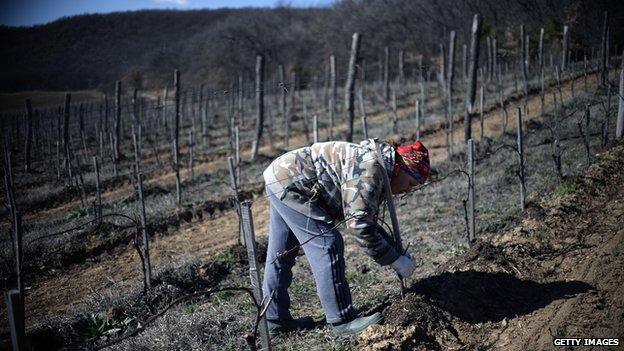
The 2014 vintage from Crimea's vineyards will be labelled Product of Russia, rather than Product of Ukraine
- Published21 February 2014
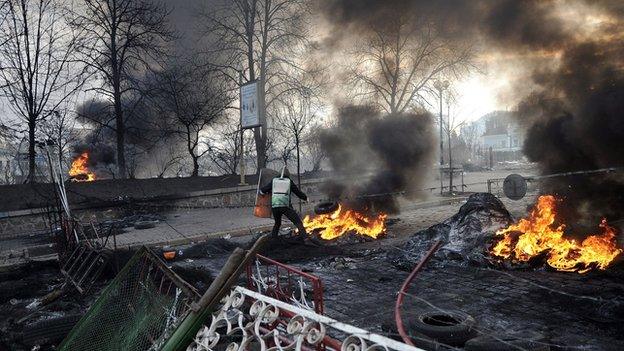
- Published11 February 2014
